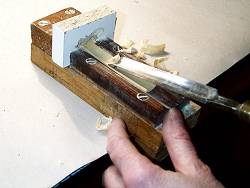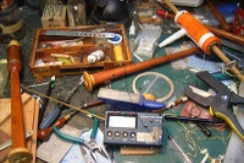Reed-making - an Introduction

Although the advantages of making your own reeds become clear the moment you damage the only working one you have, the problems involved are often so daunting that you dismiss the idea and resort to your firendly pipe-maker instead. In this section, we hope to compile the necessary information that will enable you to tackle the task yourself.

I'm not sure at present how this project will develop; this page is very much an experiment; hopefully those who have made their own reeds will contribute their experiences. A number of makers have also agreed to contribute. You can leave comments using the link below, or open a thread on the Forum [registered users only]. If you would like to make a more substntial contribution please email us via the contacts page.
To start off, here are links to current published and web resources,
More Power to Your Elbow; published by LBPS conatins a reed making section with contributions by several pipemakers
Anita Evans smallpipe reed pages: http://www.evansbagpipes.co.uk/pipes/reedmake/chant.htm
Colin Ross smallpipe reed making Youtube videos [15 parts] http://www.youtube.com/watch?v=Hph914LI-4g [there are two versions online; this is the high resolution version, hence the large number of parts].
Colin's publication "Reedmaking for Northumbrian and Scottish Smallpipes",
which contains excellent photos and detailed technical information is obtainable direct from Colin at: This email address is being protected from spambots. You need JavaScript enabled to view it. (UK)
John Burke Border pipe reed-making notes. http://www.borderpipe.com/Reedmaking%20notes.htm
Materials and Tools
The first problem a novice reed-maker faces is the question 'What materials and tools do I need and where do I get them/'. We hope to have makers' answers here soon. Meanwhile, from Anita's pages [see above link]
"Tube Cane (L. Arundo Donax)
This can be obtained direct from the grower, a specialist company, or bought in small quantities from woodwind suppliers. Ask for bassoon cane. A kilo gives you quite a lot of pieces, about 180mm or so long by 25mm diameter. It's best to share between a few people if you don't make many reeds, as I find the quality of the cane can deteriorate in time. I store mine in a sealed plastic bag, though opinions on this (and many other things) differ widely!"
"Small quantities of good quality reed cane can be obtained from: http://www.howarth.uk.com/"
'Three keys to the perfect reed - 1. A sharp knife, 2. . A sharp knife, 3.. A sharp knife," [Lien Wang, principle oboe http://www.youtube.com/watch?v=iV_4Bw9phQk&NR=1}

